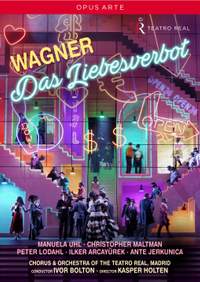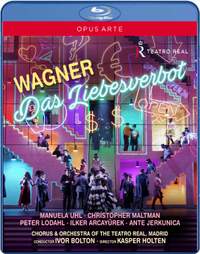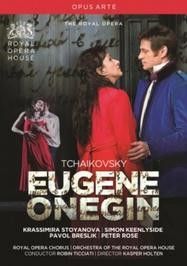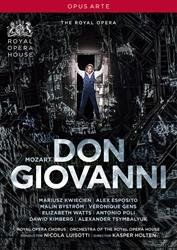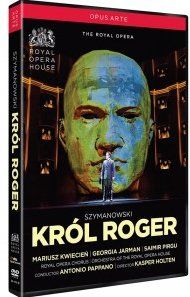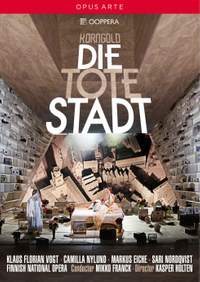Interview,
Kasper Holten on Das Liebesverbot
 Card-carrying Wagnerphile though I am, I’ll admit that until recently I’d never really explored his early works for the stage in any depth, mainly through lack of opportunity: complete recordings and performances of the ‘non-canonical’ operas are still rarer than hens’ teeth, and (barring a very fine concert-version of Die Feen in London a few years ago) my frame of reference only really began with Der fliegende Holländer. What a pleasure it was, then, to discover the 1836 comedy Das Liebesverbot (loosely based on Shakespeare’s Measure for Measure) via an uproariously colourful production from the Teatro Real Madrid, staged by Covent Garden’s outgoing Director of Opera Kasper Holten. Had I done a ‘blind tasting’ of the DVD (out now on Opus Arte), I honestly can’t guarantee I’d have successfully identified the composer (at least if I’d fast-forwarded through the overture, where his portrait looms large over the stage!): the score itself is fast and furious with both patter-singing and coloratura, and Holten responds with direction shot through with commedia dell’arte and burlesque references and episodes of knockabout farce.
Card-carrying Wagnerphile though I am, I’ll admit that until recently I’d never really explored his early works for the stage in any depth, mainly through lack of opportunity: complete recordings and performances of the ‘non-canonical’ operas are still rarer than hens’ teeth, and (barring a very fine concert-version of Die Feen in London a few years ago) my frame of reference only really began with Der fliegende Holländer. What a pleasure it was, then, to discover the 1836 comedy Das Liebesverbot (loosely based on Shakespeare’s Measure for Measure) via an uproariously colourful production from the Teatro Real Madrid, staged by Covent Garden’s outgoing Director of Opera Kasper Holten. Had I done a ‘blind tasting’ of the DVD (out now on Opus Arte), I honestly can’t guarantee I’d have successfully identified the composer (at least if I’d fast-forwarded through the overture, where his portrait looms large over the stage!): the score itself is fast and furious with both patter-singing and coloratura, and Holten responds with direction shot through with commedia dell’arte and burlesque references and episodes of knockabout farce.
We’re very grateful to Kasper for sparing time in the run-up to his new production of Die Meistersinger (unveiled tonight, or rather this afternoon, at Covent Garden) to let me pick his brains a bit about Wagner’s earlier foray into comic opera of a much broader variety…
Perhaps an obvious question to begin with, but why do you think Das Liebesverbot has received so few outings on stage, and what particular challenges (and rewards?) does it pose for a director?
The young Wagner had not yet found his own creative voice, and he did not himself count it among his canonical works. The piece is uneven and sometimes sounds as if Wagner is writing a pastiche on other composers. But it is intriguing to see where Wagner came from and in glimpses to see and hear who he would become. And if you treat it as the wonderful, easy comedy that it in fact is, and help the piece here and there, I think it has many overlooked qualities.
How much material did you cut for this staging, and how did you reach your decisions about what to omit?
It was a close collaboration with Ivor Bolton. We knew we wanted to more or less present the work complete – ie not leave out entire numbers or let some of the musical material be unheard. But whilst Wagner never quite learnt to restrain himself and be brief, in his youth he was particularly fond of repeating things over and over again, it seems. So we went for a lot of trimmings here and there, and slimmed down the piece rather than to cut longer stretches. And I am sure some of the singers were very grateful for us cutting some of the repeats in some long, very demanding passages!
Measure for Measure is often classed as a ‘problem-play’ rather than a comedy – do you think Wagner’s reworking of the source-material tips the balance more towards straightforward comedy (much as Berlioz does with Much Ado About Nothing/Bêatrice et Bénédict), or was it a conscious decision on your part to downplay any darker elements at work?
I think it is hard not to see it as a comedy, both in terms of the musical language and in terms of the way the plot unfolds. Whilst it obviously – as any good comedy – has darker moments and subjects, the characters are all wonderfully over the top, and I quite frankly think Wagner himself must deliberately have gone for a comic take on the characters in the piece – both the heroes and the villains. The musical language that he seems inspired by also seems to suggest operetta rather than dark romantic opera.
That giant, all-seeing eye that dominates the set has echoes of The Great Gatsby, as well as Foucault and Orwell – did any of those works/writers directly influence your thinking, and what other sources/traditions did you draw on in your depiction of carnival and surveillance?
It was clear to us that the theme – the state wanting to control its citizens, but also the hypocrisy then demonstrated by the leaders, something we recognise from almost any totalitarian regime ever – would be expressed well by the tension between the strong symbols of the state, the all-seeing regime, and then the sad and funny characters who own the power. The piece should not be taken too seriously, but if there is anything at all the opera is about, it is surely hypocrisy.
Wagner was famously dismissive of his own early operas and went to some lengths to distance them from his mature work – to what extent do you see Liebesverbot as a separate entity from the ‘canonical’ operas, and how much foreshadowing of his later style and preoccupations do you find in it?
There are moments where you hear sounds, harmonies, transitions that will later be part of how we understand Wagner. But it seems to me that the longer stretches is in fact not Wagner yet. Simon Callow expressed it so well, when he did his one-man Wagner show for us at ROH: it is as if Wagner as a young composer needs to go through the exercise of writing a whole opera in the established style of the day, in the language of other composers – to try it out and to get it out of his system, so to speak, before he could find his own voice. But whilst he clearly felt this was not his own voice, there is no reason we today should not enjoy it for what it is.
Without wishing to fish for spoilers, you’re directing Wagner’s other comedy, Die Meistersinger, at Covent Garden this spring – do you see much common ground between the two works, and has your experience with Liebesverbot coloured your perspective on Meistersinger in any way?
The two works are rather different. Whilst Meistersinger is also called a “comedy”, it is clearly a much more profound and complex comedy than the more straight-forward and sometimes over-the-top Liebesverbot. But of course everything I do will in some way go into my personal “luggage”, and I can’t deny that doing Liebesverbot did reveal a certain self-ironic twinkle in the eye with Wagner, as he makes fun of the Germans. That was maybe worth thinking about – that Wagner is capable of self-irony, and in finding empathy for his “enemies” – as I set out working on Meistersinger.
Wagner: Das Liebesverbot (DVD)
Manuela Uhl (Isabella), Christopher Maltman (Friedrich), Peter Lodahl (Lucio), Ilker Arcayürek (Claudio), Ante Jerkunica (Brighella); Teatro Real, Madrid, Ivor Bolton (conductor) & Kasper Holten (director)
Released on 27th January on Opus Arte
Available Format: DVD Video
Wagner: Das Liebesverbot (Blu-ray)
Manuela Uhl (Isabella), Christopher Maltman (Friedrich), Peter Lodahl (Lucio), Ilker Arcayürek (Claudio), Ante Jerkunica (Brighella); Teatro Real, Madrid, Ivor Bolton (conductor) & Kasper Holten (director)
Released on 27th January on Opus Arte
Available Format: Blu-ray
Other productions directed by Kasper Holten
Tchaikovsky: Eugene Onegin (DVD)
Krassimira Stoyanova (Tatyana), Simon Keenlyside (Eugene Onegin), Elena Maximova (Olga), Pavol Breslik (Lensky); Royal Opera House, Robin Ticciati, Kasper Holten (director)
'Holten's principals break the heart: Krassimira Stoyanova's aching, ringing Tatyana embraces her youthful alter ego at the core of the Letter Scene; baritone Simon Keenlyside's 'old' Onegin wills tenor Pavol Breslik's handsome Lensky not to die...Ticciati mirrors the production's palpitations' (BBC Music Magazine)
Available Format: DVD Video
Mozart: Don Giovanni (DVD)
Mariusz Kwiecien (Don Giovanni), Alex Esposito (Leporello), Malin Byström (Donna Anna), Véronique Gens (Donna Elvira); Royal Opera House, Nicola Luisotti, Kasper Holten (director)
'Holten shows us Giovanni as a man older than usual, lonely, perhaps trying to stave off his fear of death with each new seduction...the acting is beyond praise...Kwiecien has a dangerous charm.' (Gramophone)
Available Format: DVD Video
Szymanowski: Król Roger (DVD)
Mariusz Kwiecien (King Roger II of Sicily), Georgia Jarman (Roxana), Saimir Pirgu (Shepherd); Royal Opera House, Antonio Pappano, Kasper Holten (director)
'All the imagination of Kasper Holten's production coheres compellingly, and Antonio Pappano shapes an extremely lucid performance that somehow manages to be taut and lush at the same time. Mariusz Kwiecien's warm account of the title role shows why he has become today's ruling King Roger.' (BBC Music Magazine)
Available Format: DVD Video
Korngold: Die Tote Stadt (DVD)
Klaus Florian Vogt (Paul), Camilla Nylund (Marietta); Finnish National Opera, Mikko Franck, Kasper Holten (director)
'Holten's surreal evocation of Bruges, the dead city of the title, is wonderfully creepy...Vogt excels as the wild-eyed, obsessive Paul, desperately trying to make over Camilla Nylund's slutty Marietta in saintly Marie's image.' (The Guardian)
Available Format: 2 DVD Videos


